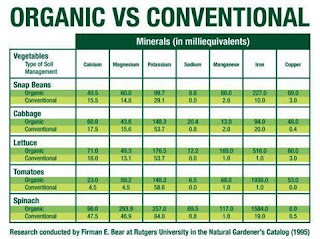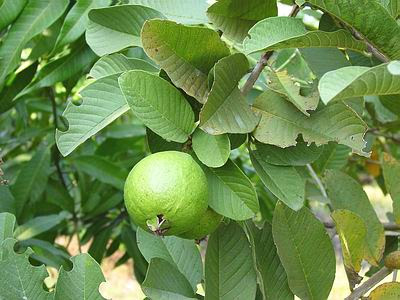10 benefits of eating organic food
1. Avoid chemicals
The National Academy of Sciences reports that 90% of the chemicals applied to foods have not been tested for long-term health effects before being deemed "safe." Further, the FDA tests only 1% of foods for pesticide residue. The most dangerous and toxic pesticides require special testing methods, which are rarely if ever employed by the FDA.
More than 400 chemical pesticides are
routinely used in conventional farming and residues are often present in
non-organic food.
2. Benefit from more nutrients
Organically grown foods have more nutrients—vitamins, minerals, enzymes, and micronutrients—than commercially grown foods because the soil is managed and nourished with sustainable practices by responsible standards.
3. Enjoy better taste
Try it! Organically grown foods generally taste better because nourished, well-balanced soil produces healthy, strong plants. This is especially true with heirloom varieties, which are cultivated for taste over appearance.
4. No nasty additives. Organic food doesn't contain food additives
that can cause health problems such as heart disease, osteoporosis,
migraines and hyperactivity.
5. There is not a reliance on drugs. Organic farming standards
prohibit the routine use of antibiotics and growth hormones in farm animals.
6. Preserve our ecosystems
Organic farming supports eco-sustenance, or farming in harmony with nature.
Preservation of soil and crop rotation keep farmland healthy, and chemical abstinence preserves the ecosystem. Wildlife, insects, frogs, birds, and soil organisms are able to play their roles in the tapestry of ecology, and we are able to play ours, without interference or compromise.
7. Reduce pollution and protect water and soil
Agricultural chemicals, pesticides, and fertilizers are contaminating our environment, poisoning our precious water supplies, and destroying the value of fertile farmland. Certified organic standards do not permit the use of toxic chemicals in farming and require responsible management of healthy soil and biodiversity.
According to Cornell entomologist David Pimentel, it is estimated that only 0.1% of applied pesticides reach the target pests. The bulk of pesticides (99.%) is left to impact the environment.
8. Preserve agricultural diversity
The rampant loss of species occurring today is a major environmental concern. It is estimated that 75% of the genetic diversity of agricultural crops has been lost in the last century. Leaning heavily on one or two varieties of a given food is a formula for devastation. For instance, consider that only a handful of varieties of potatoes dominate the current marketplace, whereas thousands of varieties were once available.
9. Support farming directly
Buying organic food is an investment in a cost-effective future. Commercial and conventional farming is heavily subsidized with lot of funds through governments.
10. Keep our children and future safe
Let them be safe and have a healthy life.
Sources
ecochildsplay.com
http://www.prevention.com/
The National Academy of Sciences reports that 90% of the chemicals applied to foods have not been tested for long-term health effects before being deemed "safe." Further, the FDA tests only 1% of foods for pesticide residue. The most dangerous and toxic pesticides require special testing methods, which are rarely if ever employed by the FDA.
More than 400 chemical pesticides are
routinely used in conventional farming and residues are often present in
non-organic food.
2. Benefit from more nutrients
Organically grown foods have more nutrients—vitamins, minerals, enzymes, and micronutrients—than commercially grown foods because the soil is managed and nourished with sustainable practices by responsible standards.
3. Enjoy better taste
Try it! Organically grown foods generally taste better because nourished, well-balanced soil produces healthy, strong plants. This is especially true with heirloom varieties, which are cultivated for taste over appearance.
4. No nasty additives. Organic food doesn't contain food additives
that can cause health problems such as heart disease, osteoporosis,
migraines and hyperactivity.
5. There is not a reliance on drugs. Organic farming standards
prohibit the routine use of antibiotics and growth hormones in farm animals.
6. Preserve our ecosystems
Organic farming supports eco-sustenance, or farming in harmony with nature.
Preservation of soil and crop rotation keep farmland healthy, and chemical abstinence preserves the ecosystem. Wildlife, insects, frogs, birds, and soil organisms are able to play their roles in the tapestry of ecology, and we are able to play ours, without interference or compromise.
7. Reduce pollution and protect water and soil
Agricultural chemicals, pesticides, and fertilizers are contaminating our environment, poisoning our precious water supplies, and destroying the value of fertile farmland. Certified organic standards do not permit the use of toxic chemicals in farming and require responsible management of healthy soil and biodiversity.
According to Cornell entomologist David Pimentel, it is estimated that only 0.1% of applied pesticides reach the target pests. The bulk of pesticides (99.%) is left to impact the environment.
8. Preserve agricultural diversity
The rampant loss of species occurring today is a major environmental concern. It is estimated that 75% of the genetic diversity of agricultural crops has been lost in the last century. Leaning heavily on one or two varieties of a given food is a formula for devastation. For instance, consider that only a handful of varieties of potatoes dominate the current marketplace, whereas thousands of varieties were once available.
9. Support farming directly
Buying organic food is an investment in a cost-effective future. Commercial and conventional farming is heavily subsidized with lot of funds through governments.
10. Keep our children and future safe
Let them be safe and have a healthy life.
Sources
ecochildsplay.com
http://www.prevention.com/










Comments
Post a Comment